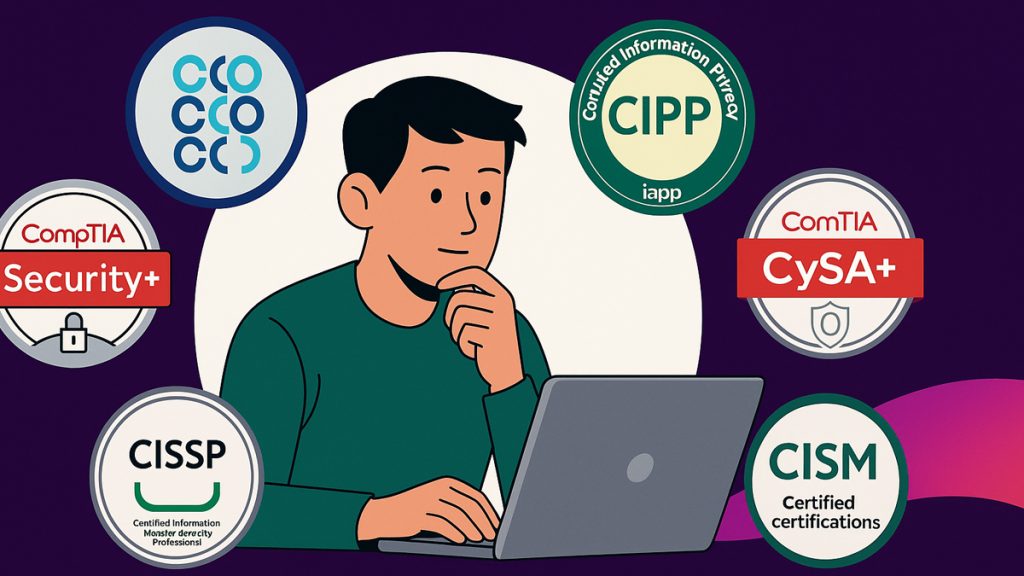Why cybersecurity is a skill everyone should learn
You don’t have to be a tech wizard to care about cybersecurity. Honestly, in 2025, if you use the internet whether for shopping, banking, working, or even just scrolling cybersecurity is part of your life. Whether you know it or not.
Threats are everywhere now. Phishing texts that look like they’re from your bank. Emails from “Netflix” saying your payment failed. Random pop-ups that say your computer has a virus (when it really doesn’t). It’s not paranoia it’s reality.
And beyond just protecting your own stuff, cybersecurity has become one of the fastest-growing career fields out there. Companies need people who understand how to protect systems, spot suspicious behavior, and respond to threats. The door is wide open for curious beginners.
Ask yourself this: would you leave your front door wide open at night? Probably not. So why leave your digital life unprotected? Learning cybersecurity even just the basics is like locking that door and installing a good alarm. It’s smart, it’s responsible, and honestly, it’s kind of empowering.
Core concepts to master first
If you’re new to cybersecurity, it can feel like learning a new language. But don’t worry. You don’t need to know everything at once. Start with the core ideas the “alphabet” of cyber and everything else builds from there.
Common threats: Know what’s out there. Viruses, ransomware, phishing, DDoS attacks they all work in different ways, but they aim to exploit weak spots. Think of them like burglars testing your windows and doors.
Password hygiene: Your passwords are your first lock. Strong ones are long, unique, and hard to guess. Using “password123” is like leaving your keys on the doormat.
Phishing and social engineering: This is about tricking people, not machines. Hackers pretend to be someone you trust, hoping you’ll click a bad link or give up sensitive info. Like a con artist in your inbox.
MFA (multi-factor authentication): This adds an extra layer of security. Even if someone steals your password, they can’t get in without the second factor. It’s like needing both a key and a code to unlock your front door.
OSI model basics: It’s not as scary as it sounds. It’s just a way of breaking down how data moves through a network. Like layers in a cake each has its role, from the frosting (your app) down to the sponge (physical wires).
Types of attacks: You’ll hear about malware, man-in-the-middle attacks, SQL injection, brute force… Just start with the concept behind each one. It’s less about memorizing acronyms, more about understanding the “why” and “how.”
| Concept | Why it matters | Example |
|---|---|---|
| Phishing | It targets human trust | Fake “bank” text asking for login |
| MFA | Adds another layer of protection | Using an app to confirm your identity |
| Malware | It infects and damages systems | Opening a bad attachment that installs spyware |
Best learning resources for starters
Good news: you don’t need to enroll in a university program to learn cybersecurity. There are tons of beginner-friendly platforms, many of them free or low-cost. What matters most is finding something that keeps you engaged.
TryHackMe is a great place to start. It’s hands-on, interactive, and walks you through real-world scenarios like scanning for vulnerabilities or spotting phishing tactics. I learned more from 20 minutes on TryHackMe than I did reading three chapters of a textbook.
Cybrary offers structured courses, including intro-level ones. It’s a bit more traditional but still beginner-friendly. Same with Coursera, especially the Google Cybersecurity Certificate, which is designed for total beginners and focuses on job-ready skills.
Don’t sleep on YouTube. There are creators who break down complex topics in simple language. You might stumble on a tutorial about Wireshark, then realize you just analyzed your first packet capture. That’s a win.
And most importantly? Just start. Pick one platform, one topic, and dive in. You can always pivot later. The internet is full of rabbit holes you just have to follow the right ones.
Final tips for staying motivated
You’ll hit roadblocks. That’s normal. The trick is to keep moving, even slowly. Celebrate small wins like finally understanding what a port scan is or fixing your first broken lab machine.
Join online communities, ask dumb questions (they’re never really dumb), and remember: consistency beats intensity. Cyber is a puzzle, and you get better by solving one piece at a time.
In cyber, even beginners can outsmart professionals if they stay curious.








